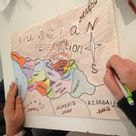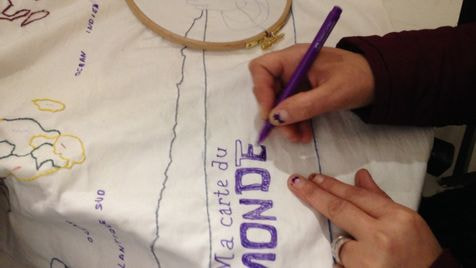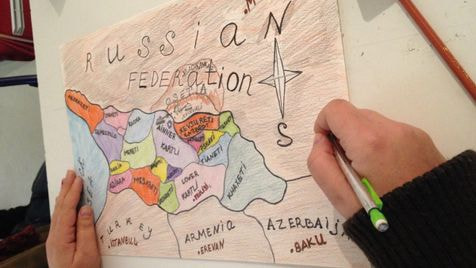A new start for the Maps from here & abroad project

Good news: the Maps from here & abroad project is the winner of the “Mental Health Migrants: Supporting People in Psychic Suffering” call for proposal!
Thanks to the support of the Solidarity for Migrants Committee of the Fondation de France, this new two-year project phase will help us generate spaces of expression for people living in exile through the development of group workshops based on an innovative methodology, at the crossroads of subjective mapping and artistic mediation.
Subjective mapping from a mental health perspective
From a therapeutic perspective, subjective mapping, based on a subjective, affective, imaginary and creative representation of what space constitutes for a person, has many advantages. It allows the creation of a map – drawn, painted, embroidered – individual or collective, which tells the story of a district, a host territory or a territory of origin, a journey into exile. The map becomes a medium encouraging the alternative expression of a migratory narrative.

The origins of the project
Launched in May 2018, the Maps from here & abroad project aims to promote the social inclusion of migrants in France through mapping and in its multiple facets. Between 2018 and 2020, it has made it possible for CartONG – thanks to the support of the Fondation de France and then the FDVA Savoie – to create new frameworks for exchange and intercultural dialogue between migrants and members of their host society, as well as to develop a methodology of subjective and participatory mapping workshops. After two years of research, exchanges with experts and many facilitation experiences, we are now proposing to adapt the subjective mapping methodology to include a mental health perspective.
Migration and Mental Health
Few migrants receive psychological support. However, all of them have been confronted to violence which we can break down in 3 main aspects: the violence experienced in the country of origin (political, or linked to family or economic, etc.), the violence of exile in itself and its many hardships, and the violence experienced when arriving in France and the difficulties linked to inclusion. However, the high mobility of migrants, the difficulty of access to consultations with psychologists and interpreters – often due to a lack of resources; as well as the reluctance to consult a mental health professional – linked to cultural representations or gender stereotypes – are often obstacles to dealing with the psychological suffering of migrants.
Three priorities for this new project phase
The activities proposed under this new project have been designed to take into account such a situation and the obstacles outlined above; and they try to address them via 3 main objectives.
On the one hand, the project aims to encourage the expression of stories about the territories of origin, the path of exile, or the new living environment of migrants. In order to do so, CartONG will work hand in hand with mental health professionals specialized in the accompaniment of migrant people (art therapists, psychologists, psychiatrists) to design a methodology of workshops halfway between subjective mapping and artistic mediation. Co-facilitated by a specialist in subjective mapping methodologies and an art therapist, these workshops will constitute a first space of expression, which will make it possible to identify and direct people expressing a need for long-term care towards an adapted care structure.

In addition, this project aims to develop a support and accompaniment offer for those involved in dealing with migrant populations in France through the training of partner structures and the creation and distribution of a freely accessible toolbox. Indeed, CartONG is keen to promote the dissemination of the methodology that will be developed as part of the project. The implementation of the workshops will lead to collaborations with various organizations, in particular emergency accommodation centers, psychiatric mobile teams for precarious publics, structures specialized in social and legal support or teaching French to foreigners. The workshops will be implemented on a national scale, with a focus on the Auvergne Rhône-Alpes region and the Ile-de-France region.
Finally, this project aims to contribute to a change of perspective on migratory phenomena and to deconstruct preconceived ideas about migrant people. To this end, participants will be able to choose to share their maps with a wider audience through an exhibition or a meeting for instance, with the idea of allowing for the reappropriation of the migration narrative, which is particularly important when confronted with administrations. The whole point of these exhibitions will then be to help generate new social interactions and raise awareness among a wider local public of the difficulties encountered by migrants, including in their host society. CartONG will draw on its previous experience in this field (Photo: Subjective mapping workshop led by CartONG, 2019).
Partner structures are being identified at the moment, with the hope to start the activities in the autumn of 2020.
The partner structures that will host the workshops are currently being identified: if your organization (CADA, emergency accommodation centre, association, etc.) accompanies migrants in France and this project speaks to you, do not hesitate to contact CartONG to find out more! We hope to be able to start the workshops as early as autumn 2020, if the health situation allows it.
* * * * *
The Fondation de France is the leading philanthropy network in France. For more information, visit its website.
Follow us on Facebook & Twitter to stay informed as this project develops!
